AMPLIFY VOL. 36, NO. 6

Yuriy Adamchuk delves into repercussions from an actual, ongoing war — in Ukraine. The author’s company, Avenga, has 11 offices and 1,300 professionals in the country. Knowing the risks of an attack (based on the 2014 invasion and subsequent expert predictions of escalation), the company developed its Service Endurance Plan. Adamchuk tells us why the implementation and execution of that plan were so successful that no employees were seriously physically hurt in the war and operations continued without interruption. He also describes how the company has taken steps to emerge from the current crisis stronger than before the war began.
When Russia invaded Ukraine on 24 February 2022, the entire world woke up to a new, harsh reality. For many Ukrainians, the awakening was abrupt, involving blaring phones and sirens urging us to seek shelter from rocket attacks threatening our homes and lives. At that time, I was COO of Avenga, a global software engineering and consulting platform with 11 offices and 1,300 professionals in Ukraine (see Figure 1). The invasion profoundly impacted me and the lives of everyone around me.
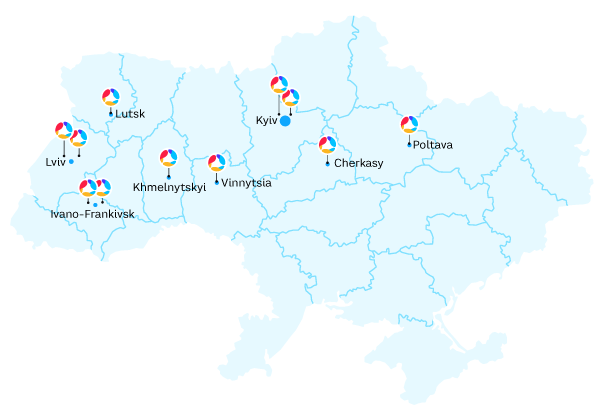
Caught up in Europe’s largest armed conflict since World War II, we had to get ourselves and our families to safety, ensure continuing business operations, and show our employees and clients that they could rely on us no matter what happened.
In today’s globalized world, geopolitical risks increasingly extend into business, with profound and far-reaching effects. Business leaders everywhere should take note of the rapidly changing circumstances in the international arena — adjusting their strategies can affect their companies’ ability to survive. Note that traditional business frameworks designed to help leaders analyze and understand the environment they’re operating in do not include the category “geopolitical risk.” In today’s globalized world, that is a dangerous blind spot.
Rising Geopolitical Issues Affect Business
In March 2021 (almost a year before Russia’s invasion of Ukraine), the US National Intelligence Council’s “Global Trends 2040” report predicted a rise in geopolitical issues over the next two decades.1 It suggested that competition for global influence would escalate to levels not seen since the Cold War era, with no single state expected to dominate all regions or domains. It predicted that a multitude of actors would vie to advance their ideologies, goals, and interests.
As multinational corporations grapple with volatile scenarios, the business landscape will be shaped by the geopolitical environment in which they operate. Whether it’s Russian aggression, turmoil in Africa, tensions between the US and China, or a pandemic, chances are good that your organization will be confronted with the type of challenges posed by geopolitical risk.
In 2022, geopolitics became established as a major current concern for business leaders, many of whom publicly stated that the uncertainty that comes with geopolitical unrest is affecting their strategies. This comes as no surprise, with 93% of multinationals reporting losses linked to political risk, up from 35% in 2020.2
Navigating the Treacherous Waters of Geopolitical Risk
Given that more than 15 million Ukraine citizens have been displaced (more than half left Ukraine altogether) and the country sustained damage to more than 150,000 residential buildings, 3,000 educational buildings, and 1,000 medical institutions as of March (the total impact exceeds US $143 billion), Avenga is doing well.
None of our employees were seriously physically injured in the war, and our operations continued without interruption. How did we accomplish this?
We developed, implemented, and executed our Service Endurance Plan (see Figure 2). The first part of this article describes Phase 1: how we went from monitoring and information gathering to scenario development and strategic planning. The second part highlights Phase 2: offering insights into the plan’s tactical execution, from communications and building reputational resilience to diversifying our footprint and taking steps to emerge from the current crisis stronger than ever.
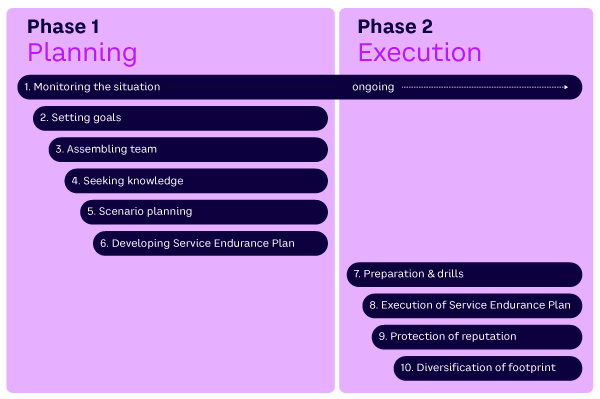
Phase 1: Planning
Monitoring the Situation
The attempted full-scale invasion of Ukraine did not catch us unprepared. The term “full-scale” is important because the original invasion started in 2014 when Russia violated international law by annexing Crimea. That act, combined with the subsequent war in Donbas, was more than enough for those of us in Ukraine to be keenly aware of the speed with which violent conflicts could escalate.
That’s a main reason Cologne, Germany, was picked as headquarters when Avenga was formed through the merger of four independent IT companies from different countries in 2019. Even though the vast majority of our employees were in Ukraine and Poland, company leaders felt a strong need to give our company a secure location in the heart of Europe.
Setting Goals
To effectively manage geopolitical risk, one must be acutely aware of what’s happening in the world. Of course, the ability of a single business to influence international politics is limited, so business leaders should focus on the aspects they can control by developing proactive risk-mitigation measures and crisis-response plans.
Leaders must start by correctly assessing their company’s position, including its current status, how it achieved that standing, and where it’s headed in the near future and beyond. The fact that these questions are basic does not mean they are easy to answer. To get to the correct result, one must calculate based on the right premises. Ask the following: Is your business model still appropriate? Does it expose your organization to disproportionate risks? What changes could be made to minimize potential hazards?
Because Avenga had been founded just two years prior, we saw no compelling reason to change our plans for the future — quite the contrary. As an international software engineering and consulting platform with strong vertical positioning, robust technical expertise, and a blue-chip customer portfolio, we wanted to move ahead at full speed despite Ukraine’s geopolitical situation.
To do this, company leadership and the supervisory board believed we would need to achieve two goals in the short, middle, and long term:
-
Keep our people safe.
-
Keep our promises to our clients at all costs.
Both goals required us to improve our ability to prepare for and adapt to changing conditions and recover from disruptions. The equation was simple: the more we improved our resilience, the faster we could recover, and the faster we recovered, the more likely we could mitigate losses.
Assembling Team
With these objectives in mind, we began assembling the right team to develop recommendations and a general action plan. Although the threat was still abstract at that point, it was evident the issue was not merely a domestic concern. On the contrary, Avenga’s leadership team agreed that we needed to leverage the full capabilities of our international organization to create the most favorable conditions possible.
The group to whom we delegated the responsibility for monitoring and managing geopolitical risks across our organization consisted of myself and several country directors, along with leading representatives from HR, finance, legal, operations, IT, information security, and communications. By bringing together senior experts from various countries and departments, we hoped to get a comprehensive understanding of our abilities and deficiencies, with the goal of facilitating quick decision-making and prompt action.
Almost immediately, we agreed on several actions we could quickly initiate, such as enhancing our security measures. We checked our redundancy and backup capacities and reinforced them wherever necessary and possible. For instance, we ensured we had multiple Internet service providers (ISPs), at least two independent power inputs, and backups of both onsite and offsite systems. Another decision we made early on was to migrate our critical infrastructure and data to secure environments in the EU and the US.
Having our data available in the cloud not only promised better protection against possible damage or destruction, it ensured that our employees could work from anywhere with an Internet connection. When the pandemic hit the year before, we were able to switch to remote work overnight; in retrospect, the pandemic was almost a dry run for what was to come.
Seeking Knowledge
In our quest for reliable information and guidance, we regularly met in working groups dedicated to specific subtopics, often inviting experts from various departments within our organization. We also made a concerted effort to engage with as many external experts as possible, seeking diverse perspectives and opinions:
-
We reached out to governmental bodies, international financial institutions, nongovernmental organizations, and peer organizations.
-
We engaged with numerous external consultants and actively participated in discussions on topics relevant to our concerns, both as sponsors and cosponsors.
-
We exchanged information with business and IT associations such as the European Business Association and the Polish Confederation Lewiatan.
Given the ever-changing news landscape, we understood the importance of collaboration, even with our strongest competitors.
Scenario Planning & Developing the Service Endurance Plan
Countless conversations during the summer of 2021 sharpened our situational awareness. Unfortunately, when it came to the crucial question of what actions we should take, the situation’s numerous interconnected variables and diverging trends made forecasting almost impossible.
As a result, we turned to scenario planning. Unlike forecasts, which predict one event and assume other possibilities will not occur, scenarios do not need to be exact to help businesses identify strategic risks and prepare to minimize potential adverse effects.
As a rule, the more uncertainty a business faces, the more valuable scenario planning becomes. For us, the experience and knowledge we gained when defining scenarios with varying durations and scopes were invaluable. They enabled us to:
-
Identify and prioritize risks.
-
Define escalation scenarios.
-
Assess financial and nonfinancial impacts (and secure the necessary funds from our investors to implement precautions that would counter their effects).
-
Develop a crisis playbook (the Service Endurance Plan).
-
Arrange relocation packages.
-
Define triggers that would put each crisis response into motion.
Phase 2: Execution
Conducting Drills & the Service Endurance Plan
Because even the best theoretical knowledge is no substitute for practical experience, we conducted multiple drills for each scenario over several weeks. This allowed us to meticulously rehearse the roles and responsibilities of each individual and rigorously test the resilience of our existing operations and the Service Endurance Plan. When we discovered a weakness, we made the necessary adjustments — nothing was left to chance.
When the day arrived, our Service Endurance Plan had been implemented, and all conceivable scenarios had been extensively tested. Every employee knew who to call, where to find prebooked buses that would take them away from danger, and which offices and hotels inside and outside the country they could go to.
Just as important were the mission-style tactics we deployed. First introduced by the German armed forces in the 19th century, auftragstaktiks require leaders to give their subordinates a clearly defined objective, time frame, and the freedom to choose the best methods to fulfill the mission. This approach was crucial to our success because strict, formal rules seldom work in a world shaped by uncertainty, chance, and human emotion.
Thanks to our extensive preparations, everyone in charge was well trained and had the necessary information and skills to make tactical decisions on the ground. As a result, the real-time execution of our evacuation and relocation was faster than any practice run, despite extreme circumstances:
-
Within hours, pre-chartered buses were ready to take hundreds of people from endangered locations to safe hotels in the Carpathian Mountains and near the Polish border.
-
Buses chartered in Poland brought Ukrainian Avenga employees to hotel rooms reserved in advance.
-
Avenga Poland and Avenga Germany welcomed colleagues and helped them get settled, including assistance with paperwork and accommodations.
-
Colleagues worldwide were prepared to take over all critical operations. This “mirrored” approach was so successful that daily operations continued for all clients without interruption.
Scenario planning didn’t only help in the early days of the war. In October 2022, after suffering a series of defeats on the battlefield, Russia targeted key infrastructure facilities away from the front lines. Once again, we were well prepared.
Most Ukrainian employees were already based in Lviv, 80 km (~50 miles) from the EU border. To ensure safe and comfortable conditions for our specialists in Eastern Ukraine, we gave them an opportunity to relocate to hotels in Western Ukraine free of charge. To secure our ability to meet our commitments to our clients and provide them with the high-quality services they expect, we made sure our offices did not depend on local electricity or local ISPs. Today, diesel generators, Starlink communications systems, biocabins, and stored water allow us to operate without interruption, even during blackouts.
Interestingly, after the first weeks, the war had the opposite effect as the pandemic. Many employees have come back to their offices and visit them regularly, as they are fortified against power and Internet outages.
Protecting Our Reputation
In an uncertain situation with countless variables and a variety of stakeholders, it’s virtually impossible to overcommunicate. Employees must constantly be informed about ongoing developments to make the right decisions. Clients require transparency because your company’s situation could negatively affect them. It’s important to reassure them that your problems will not become theirs.
The only way to communicate this believably is to establish a clear understanding of what your company stands for and what it opposes. For example, we stressed the following messages:
-
#WeAreUkrainians
-
We are fully operational.
Understanding that the more important the message, the more vital it is to repeat it, we frequently reiterated these two messages on all available channels. We engaged with our stakeholders via personal calls, face-to-face meetings, emails, and messenger chats, and we made ourselves visible on television, newspapers, and social media platforms, including LinkedIn (see Figures 3-5).
We fostered trust and reassurance by being available 24/7 and actively seeking ways to be transparent about our situation. As long as there were questions, we did not stop answering them. This dedication helped us safeguard our reputation and maintain strong relationships with all relevant stakeholders.
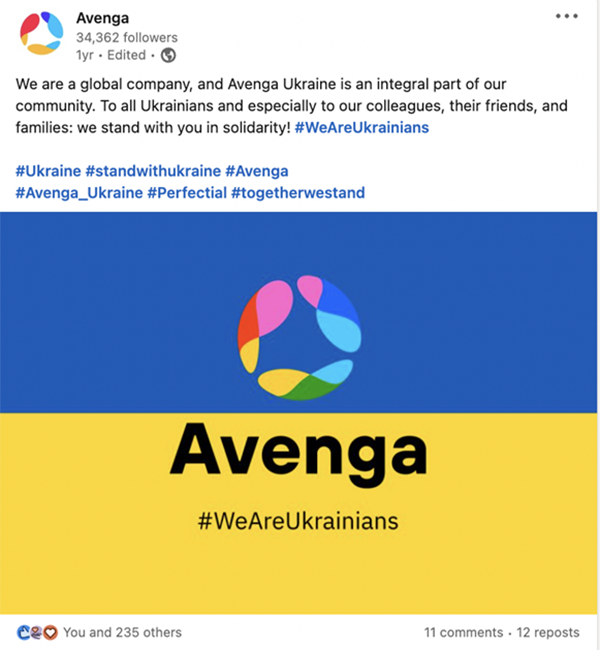
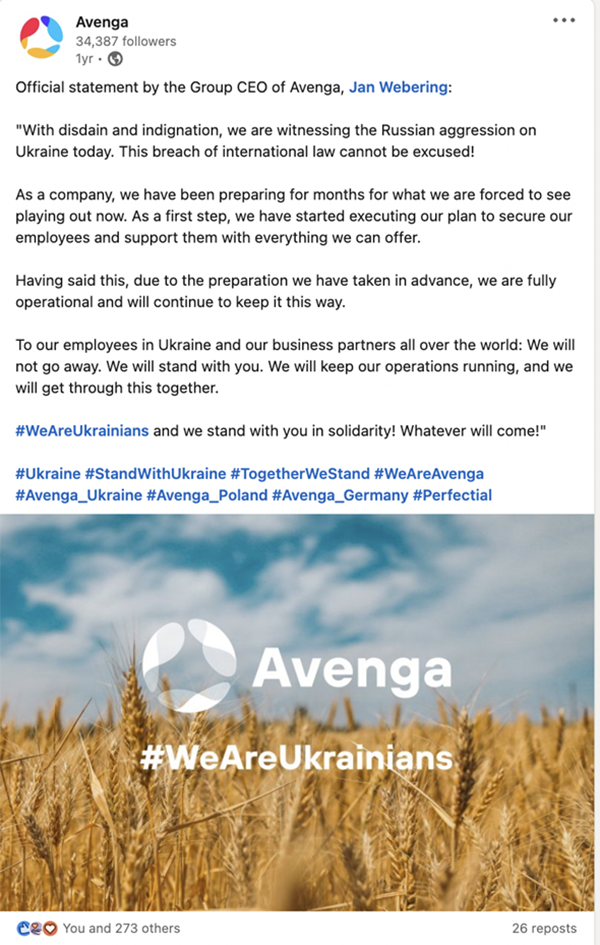
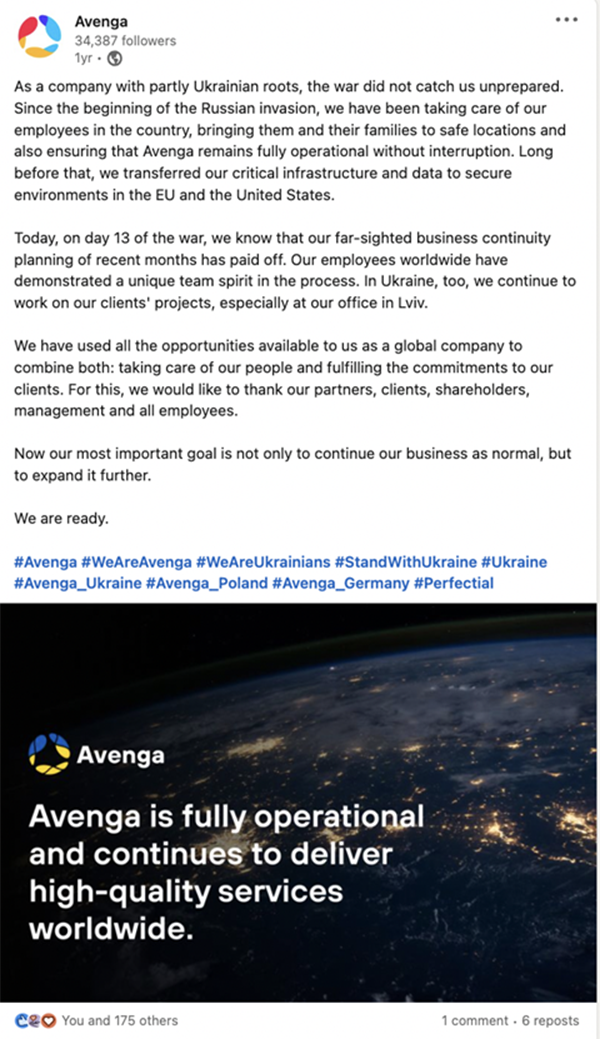
Diversifying Our Footprint
From the outset, our goal was to establish Avenga as a global player, seeking out like-minded companies that match our high standards, enabling us to penetrate new continents and markets.
Diversifying our global footprint also plays a crucial role in mitigating geopolitical risk. By spreading our operations across several countries and continents, we avoid excessive exposure to any single market that may be unstable, whether that stems from legislative issues, rising inflation, or a volatile political environment.
Our acquisition of Argentina-based IncluIT in November 2022 was essential to this goal, adding 800 professionals operating across 17 countries (predominantly in Latin America) to our platform. With an extensive network of delivery centers across Europe, Southeast Asia, and Latin America, we can provide a high level of service to our customers even in times of geopolitical upheaval.
Stronger Than Before
Our story is a powerful reminder that shared purpose, hope, and personal commitment during a major disruption can lead to the type of success that might not be achieved through traditional methods.
For example, the merger of four formerly independent companies into Avenga in 2019 brought to light many cultural differences, leading to discussions about our values and identity. Russia’s attack brought an end to only talking. Instead of engaging in theoretical debates, we needed to take immediate action, and we did just that.
When the war broke out, Avenga managed to relocate more than 300 individuals to Lviv and the Carpathians in Western Ukraine and a similar number to Poland, providing shelter and support for our employees and their families. That dedication continues to this day.
Avenga employees from Ukraine, Poland, and Germany privately raised several hundred thousand dollars to support various projects. With additional support from the company, the funds were used to purchase a fire truck, ambulances, tactical aids, walkie-talkies, Starlink devices, and truckloads of medical equipment and other humanitarian aid.
Witnessing our employees from Poland and Germany standing shoulder to shoulder with their Ukrainian colleagues was exhilarating. Ultimately, it was the best form of integration we could have hoped for.
Despite numerous challenges ahead, we feel confident because we are prepared. We continue to monitor the geopolitical landscape and have established plans and processes to cope with almost every conceivable development. Due to our comprehensive scenario planning, the tenacious execution of our Service Endurance Plan, and our strategic expansion, we are more resilient than ever.
Our challenges are unique, but I hope the insights in this article will prompt other leaders to consider how they can best integrate geopolitical risk into their business strategy and prepare their organizations for future challenges. As Andrew Grove, Intel’s former president and CEO, famously put it: “Only the paranoid survive.”3
References
1 “Global Trends 2040: A More Contested World.” US National Intelligence Council, March 2021.
2 “2023 Political Risk Survey Report: How Are Global Businesses Managing Today’s Political Risk?” Oxford Analytica/WTW, accessed June 2023.
3 Grove, Andrew S. Only the Paranoid Survive: How to Exploit the Crisis Points That Challenge Every Company. Doubleday Business, 1996.



